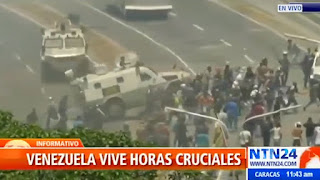2019.04.05 Why military Intervention in Venezuela is a bad idea
 I will admit that I am disturbed by naïve pro-maduro pronouncements
on the left, but I am equally disturbed, perhaps even more so, by the drumbeat for
war calling for U.S. military intervention in Venezuela on “humanitarian”
grounds. That was the same thing that happened in 1898 in the build-up to U.S.
intervention in Cuba, when the Cubans were getting close to their own victory
over the Spanish. It was a pretext for intervention to advance U.S. global
interests and we have paid the price with Cuba for over 60 years.
I will admit that I am disturbed by naïve pro-maduro pronouncements
on the left, but I am equally disturbed, perhaps even more so, by the drumbeat for
war calling for U.S. military intervention in Venezuela on “humanitarian”
grounds. That was the same thing that happened in 1898 in the build-up to U.S.
intervention in Cuba, when the Cubans were getting close to their own victory
over the Spanish. It was a pretext for intervention to advance U.S. global
interests and we have paid the price with Cuba for over 60 years.
It is my own former governor, Senator Rick Scott who is
beating the drums of war, and sending hourly tweets begging for a military
intervention in Venezuela. Why is he doing this? Senator Scott knows that to keep
his senate seat, he needs the Hispanic vote in Florida. He won his seat over
former Senator Bill Nelson largely through the Puerto Rican vote in Orlando
because of his admirable handling of the crisis of hurricane Maria in PR. Now,
he wants to lock down the rapidly growing Venezuelan community in south Florida
(and the anti-communist Cuban exile community).
Whatever one might think of Senators Scott and Rubio (I find
Rubio likable, and he comes across to me as genuinely concerned for Venezuelans
although there is no doubt he is a military hawk), military intervention is a very bad idea. I could write a small
book on unjustifiable military interventions by the U.S. in Mexico (1846), Cuba
(1898), Nicaragua (1908), Honduras, Haiti, the Dominican Republic, Guatemala
(1954) under the rubric of “gunboat diplomacy” and the “gospel of democracy.”
The sad truth is, these interventions, no matter how well intentioned, almost
always backfire with unintended consequences. The cure is worse than the
disease. Everyone remember 2004 invasion of Iraq and then the rise of ISIS in
Syria? And the almost wholesale destruction of the Iraqi Christian community? And
most often, there are business interests at work (surely we have all heard of
the United Fruit Company?
It was Eisenhour who authorized the CIA to overthrow a reformist
democratically elected government in Guatemala in 1954 (he did the same thing
in Iran, the same year). The effects of the illegal and authoritarian
governments in Guatemala that resulted from U.S. intervention in the 1950s, can
traced in a direct line to a genocidal war against Mayan peasants in the 1990s,
and the current instability that sends refugee caravans to the U.S. Mexican
border. Unintended consequences?
The people of Latin America are rightly wary when the U.S.
starts throwing its weight around in their countries. It is simple history, but
we do not learn from it. We keep on repeating the same mistakes.
On the other hand, there ARE legitimate concerns about the
Russian presence in Venezuela. Russia has stationed two nuclear bombers in the
country. The corruption and violation of basic human rights of the Maduro
regime cries out for cleansing and correction. The U.S. should put pressure on
the Russians behind the scenes and should support the OAS, or a combination of
Brazil and Colombia to handle the situation. Ultimately, it is up to the
Venezuelans to find their own solution.
There is more I could say about Cuba and Nicaragua (and
Bolivia). I have seen some articles claiming that the admiration from Senator Rubio
and John Bolton, are hoping to topple Venezuela and start a reverse domino
effect with other socialist regimes such as Ortega’s Nicaragua and Cuba. There
is almost no media coverage of protests and unrest in Honduras where there was
a U.S.-imposed coup during the Obama-Clinton administration. Yes, it does not
really matter whether there are liberal Democrats or conservative Republicans
in power; they will both almost always opt for whatever is seen as in the best interests
of U.S. businesses, regardless of the damage it does to other countries—ask me
about what the Clinton state department did to Haiti sometime.
Sorry if I come off as ranting a bit here. However, we
citizens, and even more as Christians, need to work to bring an end to our endless
wars as a nation. We serve the Prince of Peace, and while we should also be
rightly concerned for the humanitarian crisis, we also need to discern the
political agenda behind the rhetoric.

Very well stated. I would not risk my son in such a conflict, and therefore would not send anyone else's son/daughter either. Financial aid for the resistance is fine, even basic weapons.
ReplyDelete